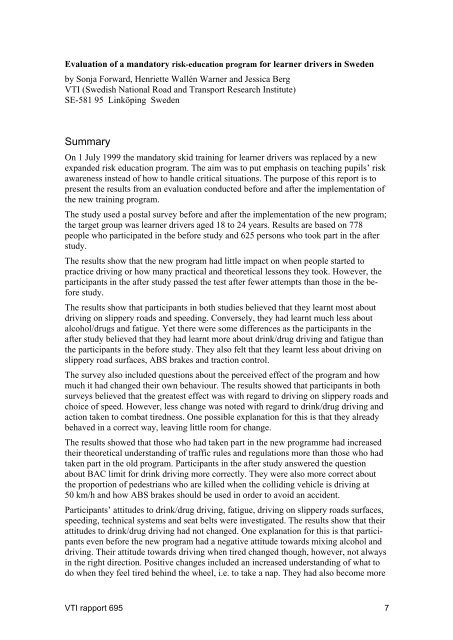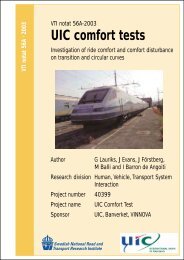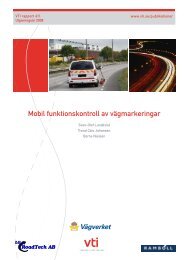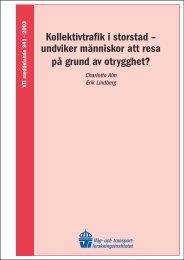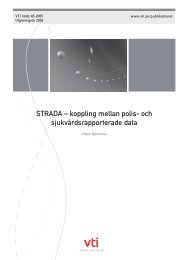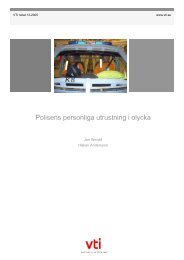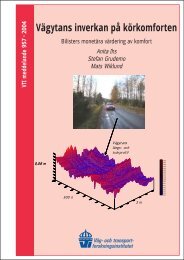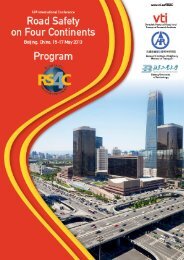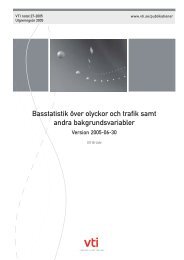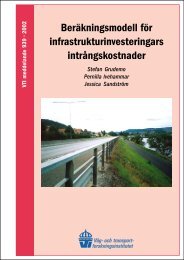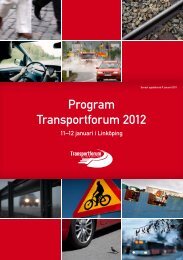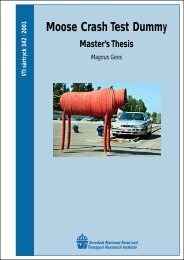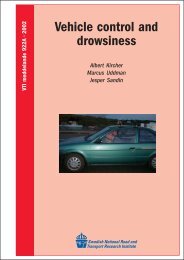En utvärdering av den utökade riskutbildningen för B-körkort - VTI
En utvärdering av den utökade riskutbildningen för B-körkort - VTI
En utvärdering av den utökade riskutbildningen för B-körkort - VTI
Create successful ePaper yourself
Turn your PDF publications into a flip-book with our unique Google optimized e-Paper software.
Evaluation of a mandatory risk-education program for learner drivers in Swe<strong>den</strong><br />
by Sonja Forward, Henriette Wallén Warner and Jessica Berg<br />
<strong>VTI</strong> (Swedish National Road and Transport Research Institute)<br />
SE-581 95 Linköping Swe<strong>den</strong><br />
Summary<br />
On 1 July 1999 the mandatory skid training for learner drivers was replaced by a new<br />
expanded risk education program. The aim was to put emphasis on teaching pupils’ risk<br />
awareness instead of how to handle critical situations. The purpose of this report is to<br />
present the results from an evaluation conducted before and after the implementation of<br />
the new training program.<br />
The study used a postal survey before and after the implementation of the new program;<br />
the target group was learner drivers aged 18 to 24 years. Results are based on 778<br />
people who participated in the before study and 625 persons who took part in the after<br />
study.<br />
The results show that the new program had little impact on when people started to<br />
practice driving or how many practical and theoretical lessons they took. However, the<br />
participants in the after study passed the test after fewer attempts than those in the before<br />
study.<br />
The results show that participants in both studies believed that they learnt most about<br />
driving on slippery roads and speeding. Conversely, they had learnt much less about<br />
alcohol/drugs and fatigue. Yet there were some differences as the participants in the<br />
after study believed that they had learnt more about drink/drug driving and fatigue than<br />
the participants in the before study. They also felt that they learnt less about driving on<br />
slippery road surfaces, ABS brakes and traction control.<br />
The survey also included questions about the perceived effect of the program and how<br />
much it had changed their own beh<strong>av</strong>iour. The results showed that participants in both<br />
surveys believed that the greatest effect was with regard to driving on slippery roads and<br />
choice of speed. However, less change was noted with regard to drink/drug driving and<br />
action taken to combat tiredness. One possible explanation for this is that they already<br />
beh<strong>av</strong>ed in a correct way, le<strong>av</strong>ing little room for change.<br />
The results showed that those who had taken part in the new programme had increased<br />
their theoretical understanding of traffic rules and regulations more than those who had<br />
taken part in the old program. Participants in the after study answered the question<br />
about BAC limit for drink driving more correctly. They were also more correct about<br />
the proportion of pedestrians who are killed when the colliding vehicle is driving at<br />
50 km/h and how ABS brakes should be used in order to <strong>av</strong>oid an acci<strong>den</strong>t.<br />
Participants’ attitudes to drink/drug driving, fatigue, driving on slippery roads surfaces,<br />
speeding, technical systems and seat belts were investigated. The results show that their<br />
attitudes to drink/drug driving had not changed. One explanation for this is that participants<br />
even before the new program had a negative attitude towards mixing alcohol and<br />
driving. Their attitude towards driving when tired changed though, however, not always<br />
in the right direction. Positive changes included an increased understanding of what to<br />
do when they feel tired behind the wheel, i.e. to take a nap. They had also become more<br />
<strong>VTI</strong> rapport 695 7


